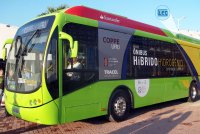
H2 +2
Silent, efficient and clean, the H2 +2 is the new version of the hydrogen-electric bus. The H2 +2 is a hybrid vehicle powered by electricity produced on board (through a fuel cell fed with hydrogen and the regeneration of the kinetic energy). The technology ensures the reuse of energy that would be dispersed in the braking of the vehicle. With autonomy of up to 500 km with a single supply, the vehicle waits only for buyers.
The second version of the bus is up to three times more economical than models already in use worldwide, with 100% national technology. It shows 40% reduction in the consumption of hydrogen and 30% in manufacturing cost compared to the previous version, launched in 2010. The forecast is for the model to start running during the 2014 World Cup.
Conceived by the Brazilian Federal University of Rio de Janeiro (UFRJ-COPPE), the H2+2 wan being shown on a closed circuit at the Parque dos Atletas, Rio de Janeiro, Brazil.
Itaipu bus
The ethanol-hybrid electric bus uses electric energy with on board generation to move the vehicle efficiently and with low emission levels. It uses two energy sources for its operation. One is a battery bank that accumulates energy and the other is the motor-generator group which can be diesel, gas or alcohol.
The Itaipu also uses the principle of regenerative braking, capturing kinetic energy during deceleration, storing this energy in batteries. The result is a 90% reduction in the emission of some polluting materials and neutralization of sulfur in the air.
The bus which is already in circulation at Itaipu was built by in partnership by some companies: Electra, WEG, Mascarello, Mitsubishi, Tutto and Euroar. Electra was responsible for designing and manufacturing the bus.
The Brazilian Ministry of Science, Technology and Innovation announced the financing of $2 billion for sustainable projects, including studies and production of this bus, at the Conference. The estimate is that 75 units will be manufactured commercially in the next two years.

